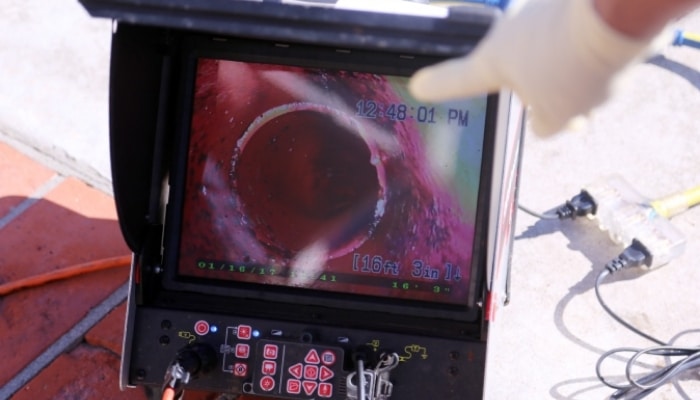
Sewer Line Clog Causes, Solutions and Prevention
When your main sewer line becomes clogged, you can’t use your water at all - no showers, laundry, dishwasher or toilets! Sewer line backups can be really frustrating, especially if it seems to happen more and more often. Fortunately, no matter the cause of the backup, there are steps you can take to ensure that it doesn't happen again. In this blog post, the plumbing pros at Hobaica Services will answer the question of why does my sewer line keep backing up? We’ll also provide you with some tips for clog prevention and what to do when those dreaded backups happen. Read on and arm yourself with all the necessary knowledge so you don’t get caught off guard by another surprise sewer line blockage!
What Is A Main Sewer Line And What Does It Do?
Your plumbing system is a large, connected network of pipes that runs water where you need it. A big important part of that system is the main sewer line. A main sewer line is a pipe that brings all wastewater from a home out to the main sewer in the street. It channels everything going down your drains, including wastewater from showers, sinks, disposals, washing machines and toilets, and brings it all away from your house.
When the main sewer line becomes clogged, your entire plumbing system is put on hold as nothing can drain away from your house. All of a sudden, this plumbing line that we don’t really think about since it’s outta sight, outta mind, becomes a really big issue.
How Do I Know If My Main Sewer Line Is Clogged?
There are a few things you can look out for that would indicate you have a sewer line clog:
Experience More Than One Clogged Drain - First, check to see how well each of the individual drains in your home are functioning. If only one drains slowly, then it's probably a localized clog and not your main sewer line. However, if multiple drains are slow or stopped up, then it's likely a bigger issue with the main sewer line.
Hear Gurgling Noises - Another way to tell is to check for gurgling noises coming from your toilets when you flush them. If you hear a gurgling sound, that could be an indication that the main sewer line is backed up and blocking the flow of wastewater.
Inspect Sewer Cleanout - Finally, inspect the area outside where your sewer line leaves your property. You can look down in your sewer line cleanout, which is a pipe located in the ground near your house. If you see water standing in the cleanout or a sewage smell coming from it, that indicates the main sewer line is blocked and needs to be cleared out.
What Causes Main Sewer Line Backups?
There are a few common culprits when it comes to main sewer line backups. It could be due to tree roots that have grown into your pipes or an accumulation of debris and sludge over time. Other causes can include pipe corrosion, breaks in the sewer line or even objects like toys that were flushed down the toilet!
Some things that we think we can put down the line actually end up causing a ton of harm. “Flushable” wipes, for instance, should NEVER be flushed. And just because your garbage disposal CAN shred all kinds of food doesn't mean that all that food waste is good for your sewer line later on.

How Can I Treat A Clogged Sewer Line?
Sewer line clogs need to be taken care of fast. A professional plumber should be consulted to treat this problem, especially if you don't have a plumbing background. The plumber will do a few things to unclog your sewer line:
- Snake/Auger - A plumber will use a snake, or auger, to break up the clog in your sewer line. This is done by sending a long cable down the pipe, then rotating it around to grab and break apart any debris that may be stuck in the line.
- Hydro-jetting - Using high-pressure jets of water, hydro-jetting can clear out the toughest clogs. It also helps prevent clogs from reforming in the future because the high-pressure water cleans the pipe more thoroughly than a traditional auger.
- Camera Inspection - Your plumber may decide to inspect the line with a camera. This type of camera will be inserted into your sewer line to check for any unseen blockages and make sure all the debris is cleared away. It can also determine the cause of the blockage, such as tree roots.
What Can I Do To Prevent Sewer Line Clogs?
Preventing sewer line clogs is a key way to keep your plumbing system healthy and functioning properly. Here are some tips to help avoid main sewer line clogs:
- Have your pipes professionally inspected once or twice a year. Professional plumbers can locate any current or potential problems so they can be repaired before they cause a blockage.
- Use strainers or screens in the drains to capture large items that could cause a clog. Make sure to clean the strainers regularly so they don’t become too full and overwhelmed.
- Be careful what you flush down your toilet. Avoid flushing things such as facial tissues, cotton swabs, and “flushable” or baby wipes, as these items will not break down in the pipes and can easily cause a blockage.
- Apply root killer to your plumbing system to prevent tree roots from infiltrating your line.
- Don’t put a ton of food down your disposal, and NEVER put grease or oil down the drain.
Following these tips can help you avoid costly and time-consuming plumbing problems in the future. Taking preventive measures now will save you time, money, and hassle down the road!
For round-the-clock sewer line services in the Phoenix area, don’t forget Hobaica Services is here for you. Call us anytime at 602-633-9555 for fast, effective sewer line cleaning services.
